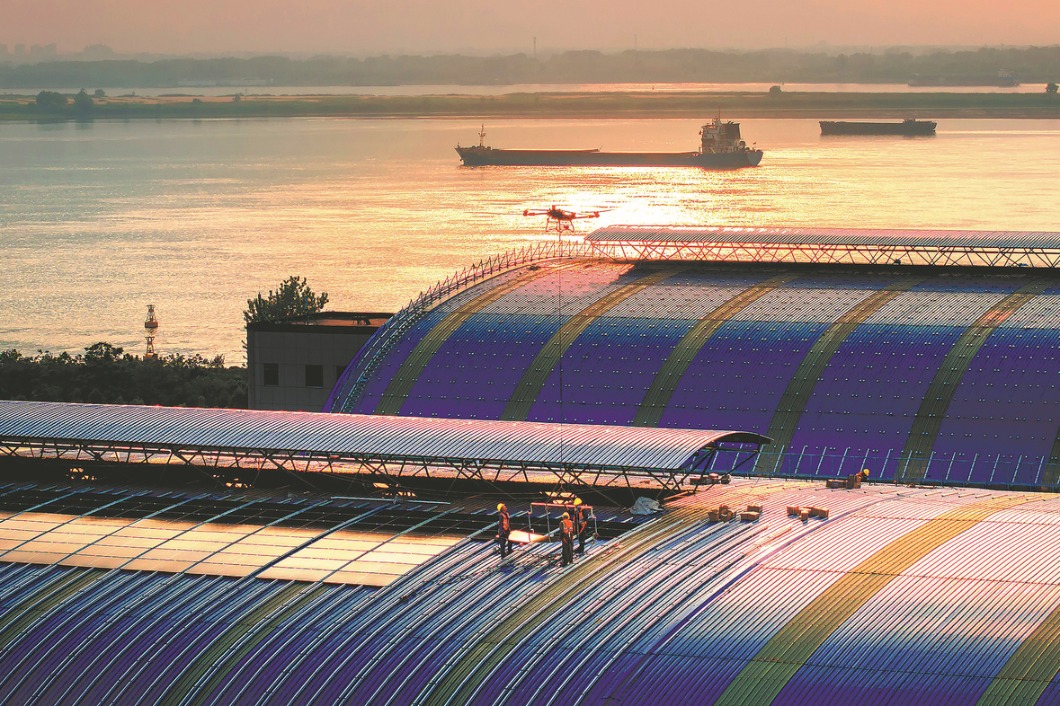Relocation program sees incomes soar
Despite moving to the city, residents are seeing their old homes become money-spinners. Hou Liqiang reports from Tanchang, Gansu.

As the minibus arduously climbed a steep, zigzagging road, the engine occasionally emitted roars and groans. The bends were so sharp that sometimes the driver had to stop and reverse a little to ensure safe passage.
Even with all the windows tightly closed, the smell of hot rubber penetrated the vehicle occasionally, indicating the friction of the tires on the ground as the bus climbed the sloping cement road.
Welcome to Shanbei and Luowan, neighboring villages located halfway up a rocky mountainside in Tanchang county, Gansu province. As the passengers marveled at the steep road after almost 20 minutes of a faltering journey from the foot of the mountain, what came into sight next made them exclaim loudly.
"The mountain is rocky and shrouded by clouds. The farmland is limited and each plot is only big enough to accommodate a cow lying down," as a local saying goes. With a bright sun, the clouds were absent, but the withered plants made the rocks stand out more and the small plots of farmland looked even more desolate.
For decades, probably even centuries, the harsh conditions in the villages left the locals plagued by poverty.
Now, though, the settlements are a reflection of how the government has worked to lift people out of poverty in places where natural conditions can barely support them.
Following relocation and industrial development measures, most people in the villages have left poverty behind as China strides toward building a moderately prosperous society in all respects by next year.
Bitter memories
For former Shanbei resident Yang Bincheng, life in the isolated village, which lies about 1,900 meters above sea level, has left many bitter memories.
For example, the road, which was once narrow and unsealed, was a major headache.
"It took at least 90 minutes if we went to buy daily necessities in Shuanghekou township. In the event of heavy rain and snow, the road was often impassable," the 38-year-old said, recalling conditions before the local government improved the road in 2015. He added that it took his three children more than 40 minutes to walk to school along the winding mud road.
Once, his 0.3-hectare farm was the sole source of income for his five-strong family, and it was challenging to transport the annual harvest of 1,500 kilograms of crops such as wheat and corn to market.
Even with a donkey to carry the crops, he could only move 50 kg down the mountain per trip, he said, adding that his annual income came to just 3,000 to 4,000 yuan ($460 to $612).
Livestock was not only key for transportation, but also for farm work as the steep, rugged terrain made the use of machinery difficult.
However, the animals were often a source of discomfort.
"Our houses were made from adobe. The animals lived on the ground floor, while we lived just above them. The animals attracted flies and made the houses smell," Yang said. "The foul odor was especially strong when it rained."
The poor conditions in Shanbei left Wang Zhengyan, an official with the township government, astonished when he was given the task of living in the village to facilitate poverty alleviation work in September 2017.
"I never saw such tatty houses," the 24-year-old Tanchang native said. He noted that some families were so poor they could not afford their own livestock and it was not unusual for two households to buy a cow together and share it.
Cai Hongming, Party chief of Shuanghekou, said that when the local government decided to relocate all the residents of the mountainous area in 2017, not one of the 282 families in the two villages could earn annual per capita disposal income of 3,217 yuan.
That meant the 1,200 residents were officially impoverished, according to Gansu's poverty standards.
Industrial development
Last year, annual per capita disposal income among villagers climbed to 6,800 yuan as a result of local government efforts to develop industries and provide easier access to job opportunities. The improvement came after the people were relocated to the urban area of Tanchang in 2018, according to Cai.
Despite the relocation, many residents still earn their primary livings in their old villages, where a chicken farm with 30,000 fowls has been built, a beekeeping industry has been established and a workshop for the processing of pepper and peppercorns has been opened, he said.
If the villagers transfer their land use rights to enable industrial development, they can receive at least 7,500 yuan a year for each hectare, and they are offered jobs in the businesses, Cai said. He added that industrial development has helped raise residents' annual incomes by 3,400 yuan on average.
A more ambitious plan is now being rolled out. The local government has reached agreement with a company, Chongqing Greening Industry Investment, to transform the villages into a tourist resort. Total investment in the project will be 650 million yuan, authorities said.
Zhang Jun, head of the project, said the company was attracted by the well-preserved traditional houses and farming culture, the beautiful scenery and the easy access for people from Chongqing.
The municipality is famous for its scorching summer temperatures, so many residents choose to escape to cool places when the city is engulfed by the annual heat wave.
The company plans to develop the villages into a scenic area rated 4A, the second-highest level in China's five-tier quality rating for such places. A trial that has been running since the May Day holiday has attracted about 10,000 tourists, and the company expects to see the scenic area fully operational by next year's May Day holiday, Zhang said.
While preserving parts of some of the traditional buildings, mainly the outer walls, the company has renovated the interiors and transformed them into guesthouses.
According to Sun Wei, deputy Party chief of Gansu, almost 500,000 people in the province who were on the national poverty-stricken list have been relocated to new homes since 2016.
He said at least one member of each family has been given a job as the government works to boost industrial development locally.
"These people have moved into their new homes smoothly. They have not only essentially settled down but are also striding toward prosperity step by step," Sun told a news conference organized by the State Council Information Office in Lanzhou, Gansu's provincial capital, on Nov 10.
New lives
After being relocated to a three-bedroom apartment, Yang, the former Shanbei resident, saw a business opportunity for freight transportation that emerged as industrial development continued in the villages.
With a government loan of 50,000 yuan, he bought a truck. He makes a profit of 50,000 to 60,000 yuan a year from his transportation business, which has been operating since 2017.
The villagers paid just over 2,000 yuan each for their new apartments, the residents said.
Cai, the Party chief, said the government donated TV sets and some furniture, including sofas and beds.
"The villagers could move in with just the luggage they carried," he said.
Chong Shicheng, another former Shanbei resident, said he never imagined that his family of seven would move into a spacious five-bedroom apartment.
He had longed for such a place for years after visiting a relative who had bought an apartment in an urban area.
In addition to the improvement in living conditions and the rise in incomes, the 40-year-old noted an exciting change that has come as a result of the relocation program.
"It was hard for young men from our village to find wives. Sometimes, over three or even five years, not even one man managed to get married. Matchmakers were usually declined if women knew they were introducing men from our village," he said.
As far as he is aware, at least seven men from Shanbei have married since they were relocated in 2018.
"The change has been huge," he said with a smile.
He said the best change for him, though, is that his children no longer need to tramp to school in the mountainous area. Their new school is just minutes away by foot.
He usually makes a living as a construction worker. Instead of leaving his hometown as he did before relocation, Chong chose to work in the county seat and pick up odd jobs. He said he wants to spend more time with his daughter, who will take the national college entrance examination next year.
"I want her to be admitted to a good university, and I hope she will not lead a tiring life like we did as migrant workers," he said.
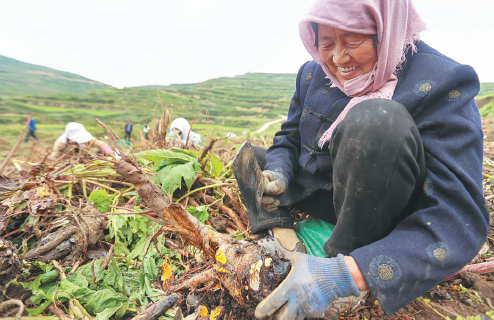
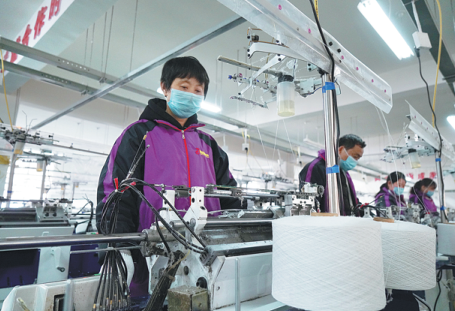
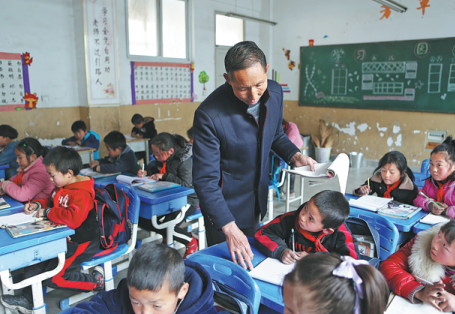
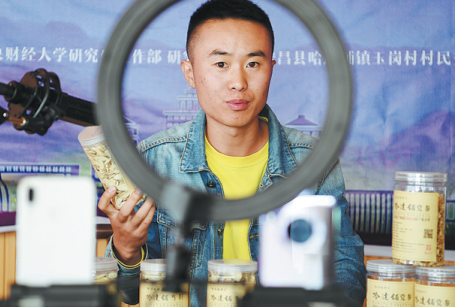
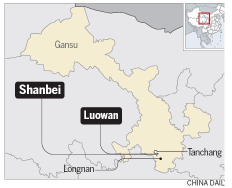
Today's Top News
- Healthy economic ties serve both sides
- China releases details of Huangyan Island nature reserve
- Xi congratulates president of Guyana on reelection
- Get the timing right to reduce 'debt cost' of natural disasters
- Advancing cooperation in global service trade urged
- PPI declines ease in Aug, first since Feb




















